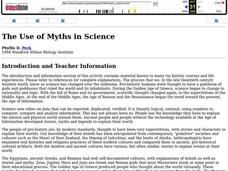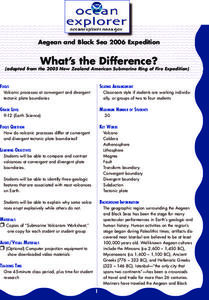Curated OER
Being in the Noh: An Introduction to Japanese Noh Plays
Learners read a Japanese Noh play and discuss its structure and traditional characters. They choose a short myth and write a Noh play based on it.
Curated OER
The Use of Myths in Science
Learners are told stories, myths and legend to explain their world. After telling the tales and discussion them, students are assigned to write a myth that describes a familiar situation, such as why the school garbage cans are always...
Curated OER
The Use of Myths in Science
Students examine folk tales to determine the basis for scientific myths. They demonstrate through the discussion of the folk tales that the perception of the world has changed as new information is gained. They write their own folk...
Curated OER
Stolen Property or Finders Keepers
Young scholars explore the questionable acquisition of priceless artworks gained as spoils of World War II. They become investigators and reporters looking into the matter of ownership of the world's greatest art.
Curated OER
I Robot, Can Do That
Students examine how underwater robots can be used to assist scientific explorations. They read and discuss an article, conduct Internet research, complete a worksheet, and present an oral report.
Curated OER
Breaking the Chains, Rising out of Circumstances
Students research, write, and draw about Roman versus American slavery. In this slavery lesson plan, students look at the Roman portraits of slaves, its influence on Western European art, and compare Roman slavery to American slavery.
Curated OER
Mystify with the Mathematics of Ancient Egypt
Hieroglyphics, surveying, and the pyramids may all be explored with mathematics.
Curated OER
Cloudy Days are for Reading and Writing
Students research weather proverbs and determine the scientific validity of 3 weather proverbs. They write an essay presenting their reasoning. They interview elderly people to graph the most frequently heard proverbs and theorize...
Curated OER
Goddesses Are Personifications Too!
Students explore the use of personification as a way of expressing ideals. They transfer this understanding to the present by creating an allegorical depiction of a contemporary ideal or value inspired by precedents in the...
Curated OER
Do You Have a Sinking Feeling
Students determine how marine archaeologists use historical and archaeological data to draw inferences about shipwrecks. Students plot the position of a shipwrecked vessel, and draw inferences about the shipwreck from artifacts that have...
Curated OER
What's the Difference?
Students investigate volcanic processes at convergent and divergent
tectonic plate boundaries. They read and analyze diagrams, complete a worksheet, and write an essay.
Curated OER
Our Changing View of the Solar System
Students identify and name the eight planets and the five dwarf planets in our solar system. In this space science lesson, students view a slideshow of the planets and label them on an included Solar System chart.
Curated OER
Seventh Grade Social Studies Test
In this Georgia social studies assessment worksheet, 7th graders respond to thirty multiple choice questions based on seventh grade social studies skills.
Curated OER
Guidelines for Governing: Utopia and The Prince
Students explore the power of the Church in government. In this literature lesson, students read Sir Thomas More's Utopia and Niccolo Machiavelli's The Prince. Students respond to questions regarding the works and discuss them.
Curated OER
Was Alexander Truly Great?
Learners discuss Alexander the Great and his father Philip II. They complete the worksheet, Things That Alexander Inherited, discuss Alexander's accomplishments, and write an essay examining whether Alexander was truly great.
Curated OER
Exploring & Creating Mythology
Young scholars read and compare mythological stories from ancient cultures from around the world. In small groups they read a myth and present the storyline and themes to the class, and write an original mythological story of their own...
Curated OER
Greek Mythology: All in the Family
Twelfth graders compare/contrast the Greek myth to explain an aspect of nature. They create an explanatory myth about some aspect of nature and design a mythological business card using Microsoft Word.
Curated OER
Comparing Sparta and Athens
Students are taught the differences between totalitarianism and democracy. They discuss the historical roots of the democratic tradition. Students are introduced to the term totalitarianism and are told that it is a form of government...
Curated OER
Archaeology Quiz 14
In this archaeology worksheet, students answer multiple choice questions about the archaeology of the Byzantine Empire, dinosaurs, and more. Students complete 5 questions total.
Curated OER
I'm Being Followed By a Moonshadow
Students explore solar and lunar eclipses and how the sun, Earth, and moon cause them.
Curated OER
Goddesses Are Personifications Too!
Students discover the use of personification as a way of expressing ideals. In this Language Arts activity, students create an allegorical depiction of a contemporary ideal. Students write labels that clearly support the...
Curated OER
Focus on the Topic When Writing
In this focus on the topic when writing worksheet, students read how to select and narrow a topic, check resources and write a thesis sentence.
Other
Ancient greece.org: Minoan Culture
Captivating collection of information and images of Minoan civilization. Minoan history, architecture, art, culture, and more and covered on this site.
The British Museum
British Museum: Explore World Cultures: Ancient Greece
Learn about the art of ancient Greece in this historical overview and image gallery of Greek art with detailed descriptions, from the collection of the British Museum.

























